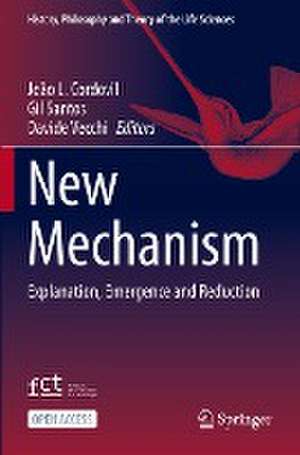New Mechanism: Explanation, Emergence and Reduction: History, Philosophy and Theory of the Life Sciences, cartea 35
Editat de João L. Cordovil, Gil Santos, Davide Vecchien Limba Engleză Paperback – 13 dec 2023
| Toate formatele și edițiile | Preț | Express |
|---|---|---|
| Paperback (1) | 354.38 lei 6-8 săpt. | |
| Springer International Publishing – 13 dec 2023 | 354.38 lei 6-8 săpt. | |
| Hardback (1) | 428.07 lei 6-8 săpt. | |
| Springer International Publishing – 13 dec 2023 | 428.07 lei 6-8 săpt. |
Din seria History, Philosophy and Theory of the Life Sciences
- 15%
 Preț: 642.83 lei
Preț: 642.83 lei - 18%
 Preț: 735.84 lei
Preț: 735.84 lei - 15%
 Preț: 644.95 lei
Preț: 644.95 lei - 9%
 Preț: 627.82 lei
Preț: 627.82 lei -
 Preț: 349.63 lei
Preț: 349.63 lei - 18%
 Preț: 1240.76 lei
Preț: 1240.76 lei - 18%
 Preț: 785.55 lei
Preț: 785.55 lei -
 Preț: 398.63 lei
Preț: 398.63 lei - 15%
 Preț: 701.06 lei
Preț: 701.06 lei -
 Preț: 389.11 lei
Preț: 389.11 lei - 15%
 Preț: 651.02 lei
Preț: 651.02 lei -
 Preț: 391.22 lei
Preț: 391.22 lei - 15%
 Preț: 646.43 lei
Preț: 646.43 lei - 24%
 Preț: 590.18 lei
Preț: 590.18 lei - 15%
 Preț: 644.49 lei
Preț: 644.49 lei - 18%
 Preț: 1120.05 lei
Preț: 1120.05 lei - 15%
 Preț: 583.78 lei
Preț: 583.78 lei - 5%
 Preț: 1103.39 lei
Preț: 1103.39 lei -
 Preț: 438.69 lei
Preț: 438.69 lei - 15%
 Preț: 693.57 lei
Preț: 693.57 lei - 15%
 Preț: 638.57 lei
Preț: 638.57 lei - 5%
 Preț: 906.63 lei
Preț: 906.63 lei - 15%
 Preț: 692.09 lei
Preț: 692.09 lei -
 Preț: 353.99 lei
Preț: 353.99 lei - 18%
 Preț: 949.23 lei
Preț: 949.23 lei - 18%
 Preț: 735.21 lei
Preț: 735.21 lei - 18%
 Preț: 725.75 lei
Preț: 725.75 lei - 18%
 Preț: 792.19 lei
Preț: 792.19 lei -
 Preț: 357.63 lei
Preț: 357.63 lei - 24%
 Preț: 713.96 lei
Preț: 713.96 lei
Preț: 354.38 lei
Nou
Puncte Express: 532
Preț estimativ în valută:
67.82€ • 73.64$ • 56.97£
67.82€ • 73.64$ • 56.97£
Carte tipărită la comandă
Livrare economică 22 aprilie-06 mai
Preluare comenzi: 021 569.72.76
Specificații
ISBN-13: 9783031469190
ISBN-10: 3031469194
Ilustrații: XII, 272 p. 1 illus.
Dimensiuni: 155 x 235 mm
Greutate: 0.4 kg
Ediția:1st ed. 2024
Editura: Springer International Publishing
Colecția Springer
Seria History, Philosophy and Theory of the Life Sciences
Locul publicării:Cham, Switzerland
ISBN-10: 3031469194
Ilustrații: XII, 272 p. 1 illus.
Dimensiuni: 155 x 235 mm
Greutate: 0.4 kg
Ediția:1st ed. 2024
Editura: Springer International Publishing
Colecția Springer
Seria History, Philosophy and Theory of the Life Sciences
Locul publicării:Cham, Switzerland
Cuprins
Chapter 1. A framework for mapping mechanistic perspectives (João Cordovil, Gil Santos, Davide Vecchi ).- Chapter 2. Different Types of Mechanistic Explanation and Their Ontological Implications (Beate Krickel ).- Chapter 3. The Metabolic Theory of Ecology as a Mechanistic Approach (Gonçalo Martins).- Chapter 4. Causing and composing evolution: lessons from evo-devo mechanisms (Cristina Villegas).- Chapter 5. Organisms need mechanisms; Mechanisms need organisms (William Bechtel and Leonardo Bich).- Chapter 6. Searching for protein folding mechanisms: on the insoluble contrast between thermodynamic and kinetic explanatory approaches (Gabriel Vallejos and Davide Vecchi).- Chapter 7. Mechanisms in Chemistry (Robin Findlay Hendry).- Chapter 8. A commentary on Robin Hendry’s views on molecular structure, emergence and chemical bonding (Eric Scerri).- Chapter 9. Fundamental Physics and (New-)Mechanistic Ontologies (João L. Cordovil).- Chapter 10. Mechanistic Explanations in Physics: History, Scope, and Limits (Brigitte Falkenburg).- Chapter 11. The Mechanisms of Emergence (Stuart Glennan).- Chapter 12. Emergence, Downward Causation and Interlevel Integrative Explanations (Gil Santos).- Index.
Notă biografică
João L. Cordovil is a Researcher at the Faculty of Sciences of the University of Lisbon and the Scientific Coordinator of the Center for Philosophy of Science of the University of Lisbon. His primary research fields are the Philosophy of Quantum Mechanics, Ontic Structural Realism and theory of emergence.
Gil Santos obtained his Ph.D. at the Universidade Nova de Lisboa. As an Assistant Researcher at the Faculty of Sciences of the University of Lisbon, he is currently working on his FCT research project ‘Relational Emergence, Causation and Explanation’.
Davide Vecchi obtained the Ph.D. at the Department of Philosophy, Logic and Scientific Method of the London School of Economics and Political Science (United Kingdom). Davide is interested in historical, philosophical and theoretical issues in molecular biology.
Gil Santos obtained his Ph.D. at the Universidade Nova de Lisboa. As an Assistant Researcher at the Faculty of Sciences of the University of Lisbon, he is currently working on his FCT research project ‘Relational Emergence, Causation and Explanation’.
Davide Vecchi obtained the Ph.D. at the Department of Philosophy, Logic and Scientific Method of the London School of Economics and Political Science (United Kingdom). Davide is interested in historical, philosophical and theoretical issues in molecular biology.
Textul de pe ultima copertă
This open access book addresses the epistemological and ontological significance as well as the scope of new mechanism. In particular, this book addresses the issues of what is "new" about new mechanism, the epistemological and ontological reasons underlying the adoption of mechanistic instead of other modelling strategies as well as the possibility of mechanistic explanation to accommodate a non-trivial notion of emergence. Arguably, new mechanism has been particularly successful in making sense of scientific practice in the molecular life sciences. But what about other sciences? This book enlarges the context of analysis, addressing the issue of the putative compatibility between the current ways of conceiving new mechanism and actual scientific practices in quantum physics, chemistry, biochemistry, developmental biology and the cognitive sciences.
Caracteristici
This book is open access, which means that you have free and unlimited access Clarifies what is “new” about new mechanism Analyses the new mechanistic credentials of nominally mechanistic models Aims to contribute to critically evaluate the scope of new mechanism in all aspects
